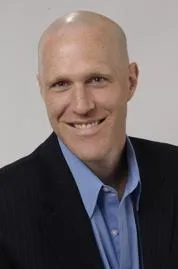Jeffrey Anderson, '92: Finding Success by Taking Games Seriously

The work life of Jeffrey Anderson, '92, is all fun and games. Or, at least, all games and mostly fun.
In 2008, after 15 years as an executive helping the biggest names in gaming-companies that included Electronic Arts and Viacom-build that industry into one that today generates more than 50 billion dollars in annual sales, he founded his own company, Quick Hit. Last fall Quick Hit, which has received 13 million dollars in venture financing, introduced its first title, Quick Hit Football, an online game with live-action graphics in which a gamer builds a team and coaches it against other online coaches.
The game's quality, along with the fact that it's free to play, have led industry observers to describe it as a breakthrough innovation. But Quick Hit is not just a game to Anderson, who has a bigger vision.
"Our aim is to create the ultimate online sports universe," he says. A coach can obtain play-calling advice from former National Football League coaches, and more than 100 current and former NFL players are available to Quick Hit gamers, who must consider those players' skills and limitations as they call their plays. The game's discussion forums allow for everything from thoughtful exchanges about strategy to intemperate smack-talking.
Anderson knows as much as anyone about the online computer gaming environment, having been CEO of Turbine, the largest private purveyor of what are known as massively multiplayer online role-playing games, from 2001 until he left to start Quick Hit. Turbine's offerings include The Lord of the Rings Online and Dungeons & Dragons Online.
But while Turbine generally charges subscription fees to its players, Quick Hit's free offering depends primarily on advertisers. That's where the not-all-fun part comes in for Anderson. "It's not the best economy to be running an innovative start-up that relies on advertising dollars," he says. "But we had more than a million games played in our first two months of operation even though word about us is really just starting to get around, and we're definitely proving attractive to the right advertisers." The company has other plans for generating revenue, including selling players, playbooks, and even naming rights for the virtual stadiums where its games are played.
As with his transition from Turbine to Quick Hit, each iteration in Anderson's career has involved moving from an established business model to an emerging one, and he says that an early experience at the Law School helped prepare him for those shifts. He graduated from college with a dual degree in economics and political science, garnering many top academic awards, and he says that when he came to Chicago, "I thought I had a very strong understanding of how the world was supposed to work."
Then he took a class taught by Professor Richard Epstein. "I quickly learned that what I understood about economics and politics was very incomplete, and often outright wrong," he says. "And I also realized that my current understanding is always at best a small part of a more complex picture. I've made it a practice to keep my eyes open for what's next."
"I'm certain that Professor Epstein couldn't pick me out of a crowd today-or for that matter out of a small group-but he's had an enduring effect on me," Anderson adds.
He attributes other benefits to his Law School experience, too, not the least of which is the ability to negotiate contracts: for instance, he personally handled the dealings with the Tolkien license at Turbine, as well as with the hundred-plus NFL stars and coaches he has enlisted for Quick Hit's roster.
And his entrepreneurial acumen may also be reinforced by his nature as an inveterate builder. "I like to make things," he says, noting that his favorite pastimes include rebuilding vintage cars and renovating the Boston-area home where he lives with his wife and two children.
As a farsighted builder with hands-on skills, it seems certain that Jeff Anderson will be a game-changing innovator for many years to come.


